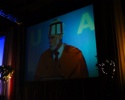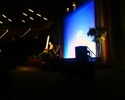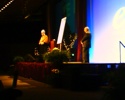Brian Hawkins started the conference by telling us that more than 7000 people are attending this year.
Vinton G. Cerf was our keynote speaker. Cerf is currently the Vice President and Chief Internet Evangelist at Google, but he’s had a long history with innovation and the internet. He was wearing the graduation garb from the University of the Balearic Islands.
He briefly mentioned Google Apps for Education – they have 2500 institutions using these applications today.
He is interested in computer science faculty taking up a challenge that has been largely unmet. Mobile users vastly outnumber computer users around the world. The largest fraction of internet users are in Asia today, with over 380 million users.
Cerf challenges the idea that computer science is a science. Normally in science you develop a theory, you predict results, you make measurements, compare with predictions, publish and iterate until predictions and measurements coincide. But computer science doesn’t work in this way.
Programming efficiency has not kept up with hardware efficiency. What can we predict? We cantalk about memory, computing requirements and time, network modeling, language grammar analysis, decidability and optimization.
But we can’t predict how long it will take to complete a program, how long it will take to find the bugs in a program, or how many we will find. We can’t predict if the program will do what it is supposed to do. We can’t even tell if a program is a worm or a virus, or even tell if a message is spam. Spam filtering is fairly effective, but the algorithms we use to detect spam aren’t very sophisticated.
Security is another challenge. Are there holes in the operating system? Does this router have vulnerabilities? Can the network be used to attack itself (auto-immune distributed, reflective denial of service)? Is the internet a bad configuration?
Cerf says we didn’t put enough authentication into the internet, and we should fix that. Public-key-cryptography was only published when the internet was getting started, so it wasn’t really available. We need to know that the information we are receiving is valid, not faked.
Digital signatures have the possibility, along with public-key-cryptography to fix the authentication issue on the internet. Cerf says we should see something soon along these lines.
But problems often come because of erroneous configurations on any of the pieces that make up the network. We need to find better ways to find configuration problems. Until we do we will have an unstable environment.
Information Management is another area ready for improvement. We need more tagging and we need automated tools for doing this. We don’t have good tools for searching video and audio (“find me a picture that looks like this one…”). We’ve made heavy use of location, and can index content according to where it is. Geolocation is coming along, but time (time of day, etc.) should also be included, along with location.
We need to preserve operating systems and software. This helps us discover old material. Without this, more and more information will become undiscoverable.
There are new user-oriented paradigms to consider. Amazon, Tivo, IM, GPS navigators, image and video sharing are all part of the self-service paradigm that makes collaboration more important. Real estate searches aren’t done in cars anymore; they’re online.
Cerf is very concerned about declining computer science enrollments. Children are natural scientists, though, so what is causing the failure? What can we do? Sputnik was a real surprise back in October 1957. In January of 1958 the US had created the NSF Science/Technology enrichment program. ARPA, NASA and a national focus on science, technology and engineering all helped the US – including Cerf himself – to dedicate themselves to science and technology.
Cerf suggests global warming is the new Sputnik. If we treat this as a national challenge, improved science and technology programs in K-12, designed fossil fuel efficient cards and power generation. France uses nuclear power to reduce their oil consumption.
This would require massive computing and new algorithms to model. Tele-working, tele-cooperation, tele-operation, tele-medicine are all possible ways to reduce our dependency on oil. What else?
Cerf then gave us an update on the Mars rovers and how they’re doing. It’s a good thing the dust devils blow the dust off the solar panels on the rovers. He also mentioned how redundant radios have kept the rovers communicating with earth (the first radios died out, but the new ones can communicate with the orbiters). Cerf sees the internet extending into space, with an interplanetary backbone being created over decades.
Questions were asked.
What about net neutrality? Google couldn’t have gotten started if the net weren’t freely available. Cerf hopes this gets addressed better next year.
Someone expressed their concerns about software losing backward compatibility and the loss of information created using that software. Cerf suggested that software makers be approached about putting their software into escrow when they create it.
What about privacy? Cerf says there isn’t much. Americans in particular are willing to give up privacy in exchange for convenience. The Myspace or iPod generation in particular seems to think it’s cool to share information about themselves. People need to be trained to think twice about what they are putting up on the internet. Identity theft is a 200-billion dollar a year problem. Our definition about what’s personal is going to have to change.
Technorati Tags: computing, EDUCAUSE2006





